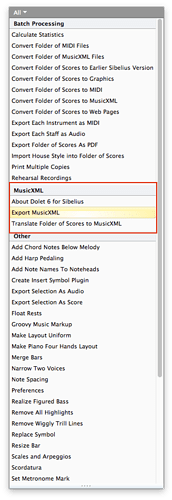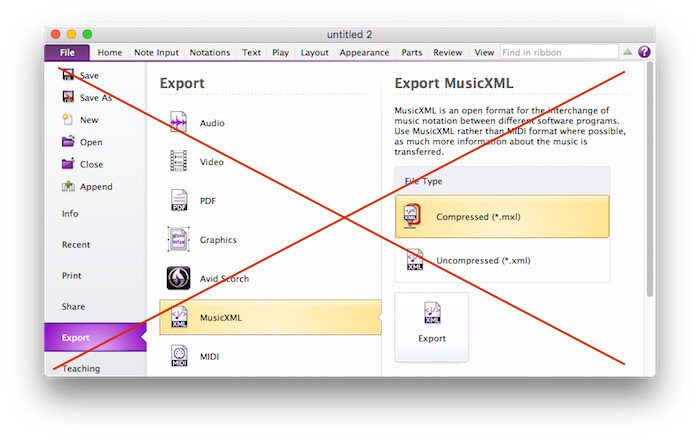You’ll be able to run Dorico in whatever language you like, and I expect you will also be able to choose whether to base your own custom key commands on those we have provided for specific language keyboards too.
Why would anyone want to switch from Sibelius to Dorico? I mean, if you already paid hundred of dollars for Sibelius, why waste $500 just to switch to Dorico so you have to learn everything again, and at this point we can only assume that Dorico will only do what Sibelius can do for many years, just differently… not to mention all the bugs yet to be discover in new software.
It’s all about workflow. For people who like the way Dorico does things, it’s worth it.
That’s simply wrong. It can already do some things much quicker and easier than Sibelius, and it can already do some things that Sibelius can’t do at all.
Of course some Sibelius users might not ever want to do those particular things, but that’s a different issue.
And if you own Sibelius it doesn’t cost $500. Considerably less. $348 Cdn, roughly 265 US.
I work with an old version of Sibelius.
Can I do a crossgrade, or will I have to buy the full version?
Daniel has said any full version of Sibelius. Sibelius First doesn’t count since it is a cut down version.
Hello, I have been writing music on Dorico, and since it does not have Virtual Drum Line (VDL) I wonder if it is possible to bring my file from Dorico and put it onto Sibelius, if it is possible, how do I do it? Do I export? Import? Do I email it? I really want to get the music done. Thanks for the help!
-Davis Chambers
I don’t use percussion but recent updates to Dorico add significant capabilities for unpitched percussion and searching “Virtual Drumline” on this forum suggests VDL can indeed be used in Dorico today. Try such a search - hopefully some of the posts will help you decide whether you want to move your music to Sibelius or simply use VDL in Dorico.
If you have VDL you can use it. I have been (slowly) putting together percussion maps and instruments.
If you are using the ‘lite’ version of VDL that I believe came with Sibelius, that part you have to then use with Sibelius.
If you’d like the snare and tenor drum percussion maps I have started working on, let me know, and I can e-mail them to you.
Robby
And yes, you could move your file to Sibelius, but it would need work. You can export as a musicXML, although Dorico does not export everything, so you might need to rework a lot of things. Or you might be able to export as MIDI which would require far more work.
Robby
I see that this thread is a couple of years old, but I thought I’d provide some first impressions of migrating Sibelius files to Dorico Pro 2 using MusicXML. In a word: mediocre. However, I’m not sure that the ‘blame’ lies with either of the notation software’s manufacturers as much as it does the poor quality of MusicXML. I’ve attempted a handful of migrations, and here’s just a short list of the problems:
- Measure repeats in Sibelius are interpreted as rests in Dorico.
- Triplet bars are broken apart.
- Instrument mappings are arbitrary and, well, bizarre, to say the least.
- MIDI settings for dynamic markings are ignored.
- Subtitles are missing.
- Second Composer field missing.
- Ranges of instruments are different (I don’t know why - instrument ranges are fairly common knowledge in the analog world).
- Percussion parts are assigned key signatures(!?).
- Random articulation markings - although present in the score - are ignored by Dorico on playback.
The upshot is that it appears as though once I get used to Dorico’s creation methodology, it will be easier to rewrite these scores rather than import them.
Try not to use the built in export to xml from Sibelius:
Instead try to export to music.xml via the Dolet 6 plugin. It does work far better (and is freely available). Once installed you will find it under the Home tab > Plug-ins:
You can get the Dolet 6 plugin after registering here:
https://store.makemusic.com/Downloads/Default.aspx?id=530
http://makemusic-downloads.makemusic.com/MusicXML/Dolet66SibeliusMac.zip
Awesome, k_b! Thanks for the tip.
Hi there and I have read most of the comments.
Without trying either the Dolet plugin suggested, or Dorico Pro 4 and so far, only SE; I found kb above is mostly correct. Other than SE which is extremely limited, this means I will have to use the Trial of Pro to adequately respond with absolute authority.
That said, what I noticed most of all when I shifted to only a piano part (SE being limited) - The ornaments like trills, ossia staff etcetera, often do not pass over. Some do surprisingly but there is a huge inconsistency using default Sibelius Music XML export, whether compressed or not (I tried both with similar experiences).
I anticipate the experience to be different for everyone. I imagine a full orchestral score will need to be edited, no matter how well it is exported, short of a direct Sibelius import facility and possibly the same for Finale users.
Considering that Finale (and Sibelius) have different data models from Dorico, I doubt we will ever see a perfect XML import from Finale that does not require some clean-up in Dorico —at least, not in my lifetime. (But will Finale even last that long as a major competitor?)
I can estimate that in creating Music XML there was an honest attempt at finding a universal platform where all notation platforms could communicate ‘evenly’.
Sort of like HTML being used on a MAC / PC / Linux /UNIX.
There are certainly good consistencies and bad, so I guess unless all of the major notation developers agree on a set of guidelines, it is as you suggested that neither of us, or many of us will not see it in our lifetimes.
Fortuitously, it is not as painful as scanning scores, then manual corrections to scores. It mainly seems to revolve around ornament, dynamics and simple layout changes rather than manually correcting piles of notes, time signatures, bars and items that do not make you wonder why you bothered importing it in the first place.
P,S - For me, I assess it based on whether it would take less time to rewrite the whole thing in or simply correct an exported MIDI file. Music XML on a large score is definitely quicker, scanned scores or pdf’s, not so much.
I’d say it really depends on many factors. Quality of the scan, complexity of the music… This is where experience matters. And can save many hours of work.

